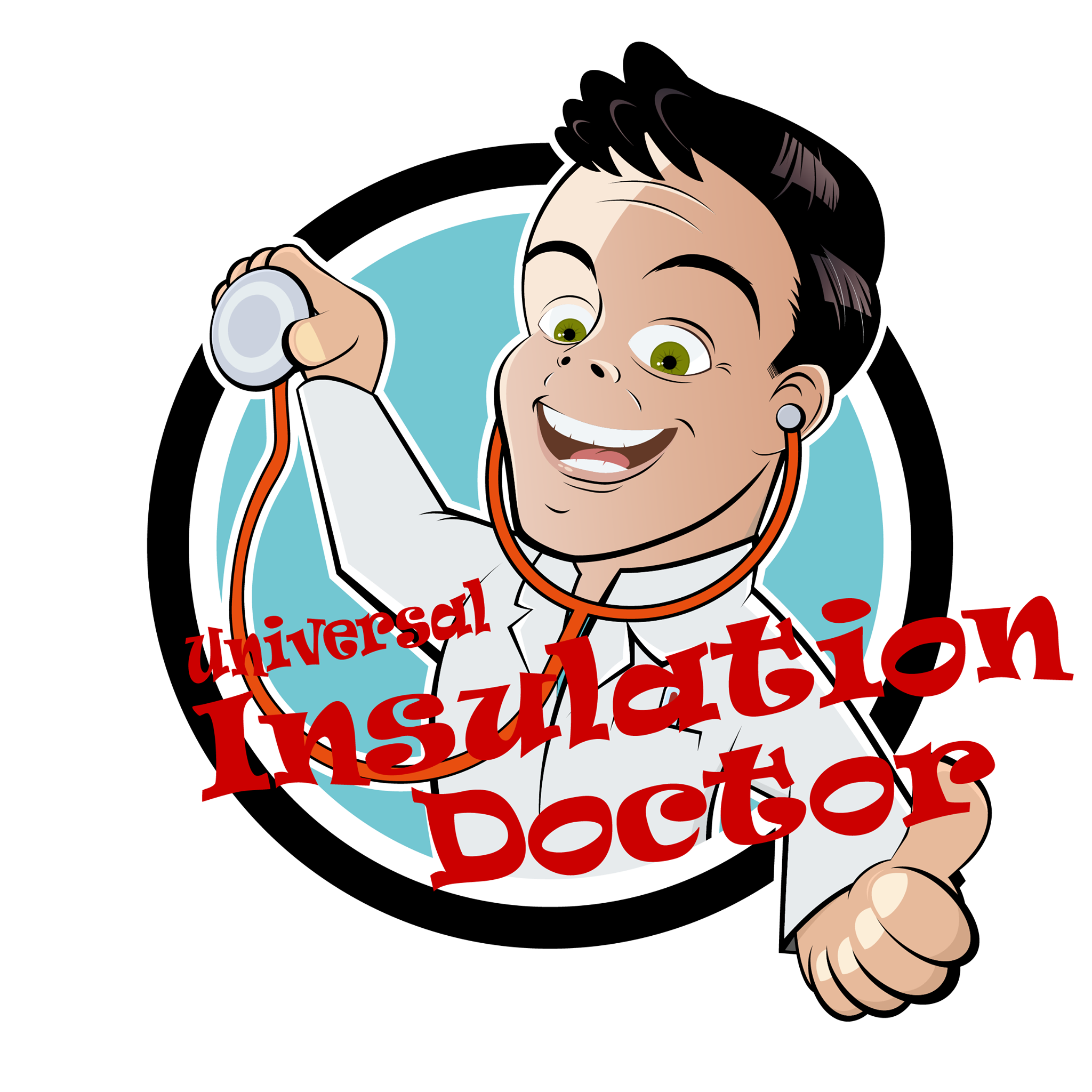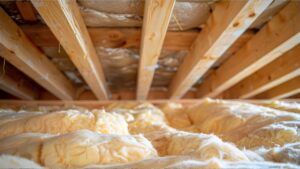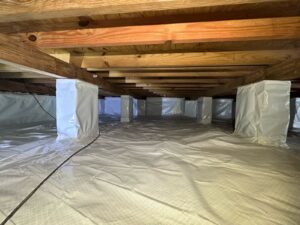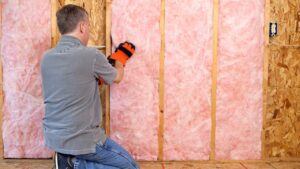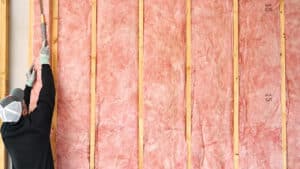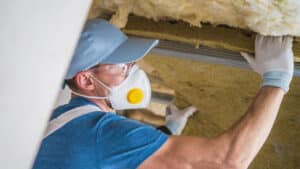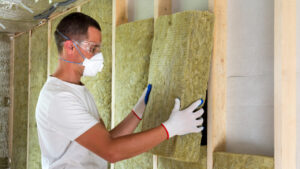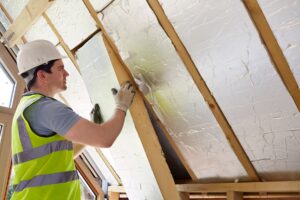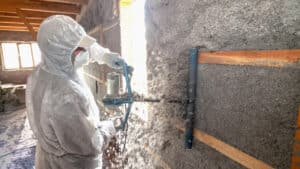Maximizing the value of your home often involves more than just superficial updates. Whether you’re considering a lawn upgrade or addressing the condition of your joists, basement renovation or a kitchen makeover, it’s important to be intentional about your home improvement efforts. When searching for ‘insulation companies near me’ in Virginia Beach, it’s important to consider factors beyond just proximity to ensure you’re getting the best service for your attic insulation needs.
One aspect that is often overlooked but can have a significant impact is attic insulation. Proper insulation not only helps conserve energy but also enhances the comfort and overall value of your home. While many homeowners focus on other insulation areas like basement and the drywall, attic insulation is among the best ways to improve your home’s warmt. Attic insulation is even more essential than improving your home’s air conditioning abilities.
By choosing the right insulation for your attic, you can lower utility bills and make your property more attractive to potential buyers. Understanding the importance of proper attic insulation for property value and taking advantage of financial incentives for upgrades are crucial steps for homeowners.
Keep reading this blog post to discover how strategic attic insulation can make a real difference in your home’s value in Virginia Beach, SC.
Insulation and its Impact on Property Value
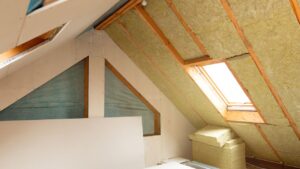
Adding effective building insulation to an attic is a strategic move for homeowners aiming to increase their property’s value. By enhancing the home’s energy efficiency, attic insulation makes the property more appealing to potential buyers who value sustainability and cost savings. This upgrade translates into an ROI of 117% – meaning it contibutes to the resale value of the house more than it costs to fix. Even more wild is that 90% of houses in American are underinsulated.
Attic Insulation is a feature that signals to prospective buyers that the home is well-maintained, up-to-date, and cost-effective to run. These attributes are increasingly important in the Virginia market, where energy conservation and efficiency are high on buyers’ priority lists.
Furthermore, from the perspective of Universal Insulation Doctor, a leader in residential insulation in the Hampton Roads area, proper attic insulation is a critical component in the overall thermal performance of a house. Homes that boast optimal attic insulation command higher selling prices, reflecting the enhanced comfort, reduced environmental impact, and lower utility bills that new homeowners will enjoy. This makes attic insulation not just an investment in the property’s future valuation.
Estimating the Return on Investment
Calculating the return on investment (ROI) for attic insulation upgrades involves assessing how the initial costs are offset by long-term energy savings and increased property value. Homeowners can expect a substantial decrease in heating and cooling expenses, contributing to a faster recoupment of the investment.
Additionally, the enhanced comfort and energy efficiency can significantly boost a home’s appeal to choosing the right attic insulation contractors.
When it comes to attic insulation, hiring the right team is essential to ensure the job is done correctly, safely, and efficiently. A professional insulation contractor will not only provide quality materials and workmanship but also ensure that the insulation is installed according to local building codes and industry standards.
| Aspect | Benefit |
|---|---|
| Energy Savings | Reduced heating and cooling costs. |
| Property Value Increase | Higher market appeal and potential sale price. |
| ROI Timeline | Shortened payback period due to energy savings and increased home value. |
The Importance of Attic Insulation for Home Value
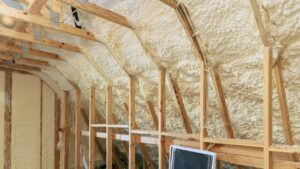
In the quest to enhance a home’s value, the attic often emerges as an unsung hero, quietly playing a pivotal role in both the comfort and energy efficiency of a household.
Attic insulation is a critical component of a home’s thermal performance.
Understanding the Role of Attic Insulation
Attic insulation serves as a shield against the relentless cycle of heat transfer, pivotal in maintaining a home’s thermal stability. By acting as a barrier to prevent warmth from escaping in the winter and blocking excessive heat from entering during the summer, insulation ensures that living spaces remain comfortable throughout the year. Moreover, this equilibrium significantly curtails energy consumption, leading to lower heating and cooling costs.
- Attic insulation creates a thermal barrier, optimizing indoor temperature regulation.
- It contributes to marked reductions in energy bills by enhancing a home’s energy efficiency.
- Increased comfort and energy savings bolster a property’s attractiveness to potential buyers, raising its market value.
This is particularly important in areas like the coordinates 36.8492541300640000, -76.0222074779350000, where the coastal climate can significantly impact a home’s energy efficiency and comfort levels.
Hiring a Great Insulation Contractor in Virginia Beach
Here are some key factors to consider when selecting an attic insulation contractor:
1. Liability Insurance and Licensing
Hire a contractor who carries adequate liability insurance and is properly licensed for the work they perform. This protects you from potential damages or injuries that may occur during the insulation project. Ask for proof of insurance and licensing before hiring a contractor.
2. Expertise and Experience
Look for contractors who specialize in insulation work and have extensive experience in attic insulation projects. Experienced contractors will have a deep understanding of different insulation materials, installation techniques, and building code requirements. A knowledgeable contractor should be familiar with the specific insulation needs of different neighborhoods, such as North Virginia Beach, where housing styles and environmental factors may vary. They can also identify and address potential issues, such as moisture problems or ventilation concerns, that may affect the performance of the insulation. Plus, they have the right tools and machines for the job.
3. Reputation and Reviews
Research the contractor’s reputation by reading online reviews, checking with the Better Business Bureau, and asking for references from previous customers. A reputable contractor should have a track record of satisfied clients and be willing to provide references upon request.
4. Detailed Quotes and Warranties
Obtain detailed written quotes from multiple contractors, outlining the scope of work, materials to be used, and the total cost. Be wary of contractors who provide verbal estimates or pressure you into making a quick decision. Additionally, inquire about warranties or guarantees on materials and workmanship.
5. Communication and Professionalism
During the initial consultation, assess the contractor’s communication skills, professionalism, and ability to explain the insulation process clearly. A good contractor should be responsive, punctual, and willing to address any concerns or questions you may have.
By considering these factors, you can increase the chances of hiring a reliable and competent attic insulation contractor who will ensure your project is completed to the highest standards, maximizing the energy efficiency and comfort of your home potential buyers, potentially increasing its sale price:
Choosing the Right Type of Attic Insulation

Deciding on the most suitable type of attic insulation is pivotal for homeowners aiming to enhance their property’s value through increased energy efficiency and thermal performance.
Between fiberglass, foam, mineral wool insulation, and cellulose insulation, each material offers distinct advantages and considerations in terms of thermal resistance, installation process, and cost-effectiveness.
Evaluating your attic’s unique requirements is crucial, as factors such as existing insulation, ventilation, and the regional climate will influence the optimal choice.
Furthermore, understanding the longevity and environmental impact of these materials can guide homeowners toward making a sustainable choice that aligns with their energy conservation goals and bolsters their home’s market attractiveness.
Fiberglass vs. Foam vs. Cellulose Insulation
When it comes to enhancing a home’s energy efficiency through attic insulation, homeowners are faced with several material choices: fiberglass, foam, and cellulose. Each boasts distinctive benefits and potential drawbacks related to thermal resistance, ease of installation, sustainability, and cost-effectiveness. Fiberglass, often lauded for its affordability and fire resistance, provides a traditional solution.
Foam insulation, although pricier, delivers superior air-sealing and sound reduction properties. Cellulose, made from recycled paper products and treated for fire resistance, offers an eco-friendly option with excellent thermal performance.
– Fiberglass insulation, widely recognized for its cost-efficiency and ability to slow the spread of fire, represents a tried-and-tested choice for many homeowners.
– Foam insulation stands out for its exceptional air sealing capabilities, which can significantly enhance a home’s energy conservation levels.
– Cellulose insulation emerges as the environmentally-conscious option, combining superior thermal performance with a lower environmental footprint.
In addition, you have to decide which type of materials, thermal insulation or reflective materials, best serve your home. Thermal insulation materials work better in cold climates than their reflective (radiant barriers) counterparts.
Financial Incentives for Attic Insulation Upgrades

Investing in attic insulation not only enhances a home’s energy efficiency but can also lead to significant financial benefits through tax credits, rebates, and a higher return on investment.
Homeowners who upgrade their attic insulation are eligible for various federal, state, and local incentives aimed at encouraging energy-efficient improvements.
Understanding these financial incentives, including how to accurately estimate the potential return on such an investment and identifying accessible local programs, is crucial for maximizing the economic advantages of upgrading attic insulation.
These initiatives not only offset initial costs but also contribute to long-term savings on energy bills. They make attic insulation upgrades an even better financial decision for homeowners looking to increase their property’s value.
Tax Credits and Rebates for Energy Efficiency
Embracing attic insulation not only paves the way for energy efficiency but also taps into beneficial tax credits and rebates. According to HomeAdvisor, insulation costs on your home can range from $1,400 to $6,300. And, the current federal tax credits can run up to $1,200 (30% of the total cost). These incentives can make a significant difference in the overall cost of insulation upgrades, potentially allowing homeowners to allocate savings to other home improvements or local entertainment options, like an evening at Pinboy’s at the Beach. This means that attic insulation not only benefits you in terms of energy conservation and temperature control, but also gives you access to tax credits and rebates.
| Benefit Type | Description | Eligibility |
|---|---|---|
| Tax Credits | Direct reductions in tax liability for energy-efficient insulation upgrades. | Homeowners who install qualifying insulation materials. |
| Rebates | Cash-back offers from utility companies or state programs for energy-efficient improvements. | Homeowners participating in approved energy conservation programs |
Conclusion
Attic insulation is a strategic investment that maximizes home value in Virginia Beach. Proper insulation reduces energy costs, improves indoor comfort, and enhances sustainability. By partnering with Universal Insulation Doctor, homeowners can leverage expert guidance and top-quality materials to achieve optimal attic insulation at a great price.
Whether you live near the intersection of First Colonial Rd and Donna Dr or elsewhere in Virginia Beach, investing in proper attic insulation is a smart decision that can enhance your home’s value and energy efficiency.
With their experience and commitment to excellence, Universal Insulation Doctor ensures a seamless process, delivering long-term benefits and increased property appeal. Don’t miss the opportunity to elevate your home’s value – contact Universal Insulation Doctor today for a comprehensive attic insulation solution tailored to your needs.
Frequently Asked Questions
Does attic insulation touch the roof during renovation?
Attic insulation typically does not touch the roof directly. It is usually installed on the floor of the attic, covering the ceiling of the rooms below. This placement helps to regulate the temperature within the living space by preventing heat from escaping through the attic and roof during cold weather and blocking heat from entering during hot weather.
Insulation touching the roof directly could interfere with ventilation and potentially cause moisture issues, so it's typically avoided. Moreover, it's essential to note that some older insulation materials, such as asbestos, may pose health risks if disturbed, emphasizing the importance of proper insulation installation and maintenance.
When should you replace attic insulation?
Attic insulation should be replaced when it shows signs of damage or deterioration or if it becomes less effective at regulating temperature. Common signs include visible mold growth, pest infestations, dampness, or if the insulation is compressed or has settled over time, losing its thickness and insulation properties.
Additionally, if your energy bills are rising despite consistent usage, it might indicate that your insulation needs replacement. Regular inspection and maintenance can help identify when replacement is necessary to ensure optimal energy efficiency and comfort in your home.
Which plumbing issues arise during attic insulation?
When installing insulation in the attic and accessing the crawl space, workers may inadvertently disturb or damage plumbing lines that run through the attic space. Additionally, if insulation is not installed properly around plumbing fixtures, pipes, or water heaters, it can lead to condensation buildup and potential moisture problems. Therefore, it's crucial to work carefully around plumbing components, ensuring they remain intact and properly insulated to prevent any issues with the plumbing system.
Does attic insulation help in summer?
Yes, attic insulation helps in the summer by preventing heat from penetrating into the living spaces below. When properly installed, attic insulation acts as a barrier, reducing the transfer of heat from the hot exterior into the cooler interior of the home. This helps to maintain a more comfortable indoor temperature and reduces the workload on air conditioning systems, resulting in lower energy costs. Additionally, proper attic insulation can also contribute to improved indoor air quality and comfort by minimizing humidity levels and preventing the formation of condensation.
How to insulate attic to prevent ice dams?
To prevent ice dams, effectively insulate your attic by sealing air leaks, ensuring proper ventilation with soffit and ridge vents, adding adequate insulation, insulating HVAC ducts, and considering roof and gutter heating cables. Additionally, maintain a proper roof pitch to facilitate water drainage. These measures collectively minimize heat transfer, preventing snow melting and ice dam formation, safeguarding your home from potential water damage.
Does attic insulation help in pest control?
Yes, attic insulation can help in pest control by acting as a barrier to prevent pests from entering your home. Properly installed insulation seals off potential entry points, such as gaps or cracks in the attic, that pests or termites could use to access your living spaces. Additionally, certain types of insulation, such as cellulose or fiberglass, can be treated with pest-resistant additives to further discourage infestations. We offer one called PestGuard that is very popular among our customers.
Which materials are commonly used in attic insulation?
Common attic insulation materials include fiberglass, cellulose, mineral wool, spray foam, glass wool, and reflective foil. Fiberglass offers affordability and fire resistance, while cellulose is eco-friendly and effective when blown or sprayed. Mineral wool provides dense, fire-resistant insulation, and spray foam creates an airtight seal. Reflective foil reflects radiant heat away, suitable for warmer climates. Each material has distinct advantages based on factors like climate and budget.
